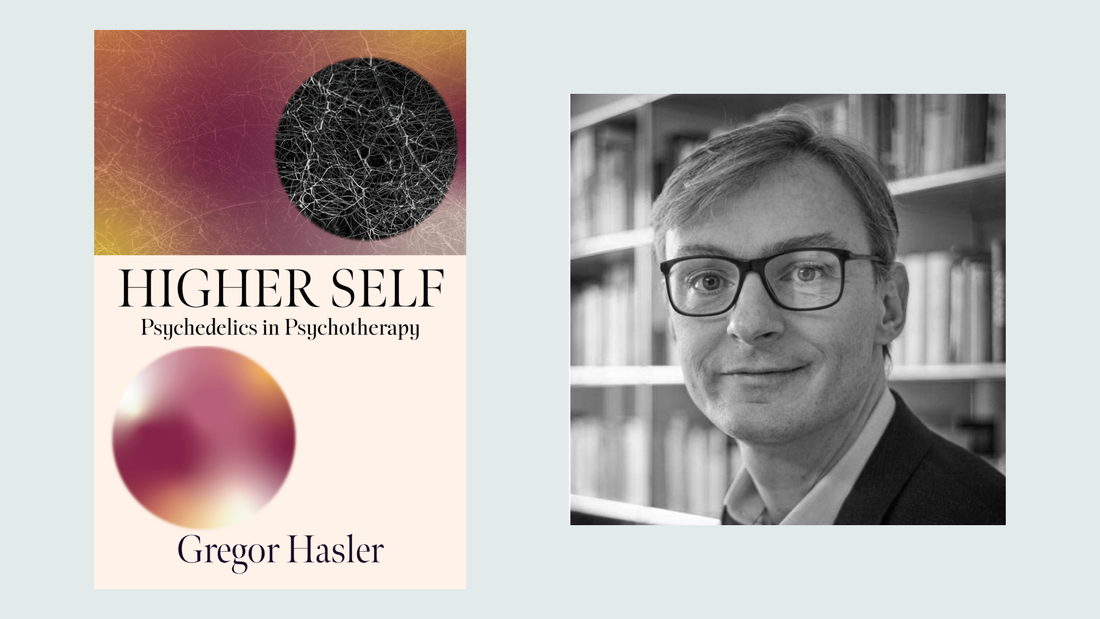
Author Spotlight: Dr. Gregor Hasler
With the launch of our new website, we felt inspired to open up deeper dialogue with the people at the heart of our work: our authors. That’s why we’re introducing the Sentient Author Interview Series, a space for thoughtful, written conversations that explore the creative process, personal inspirations, and the stories behind the books.
We invite our authors to share more about how they write, what moves them, and how their work connects to larger questions. Our hope is that these interviews spark meaningful reflection, deepen your connection to our books, and create space for intentional conversation within our growing community.
Dr. Gregor Hasler, Author of Higher Self: Psychedelics in Psychotherapy
This interview features our author, Gregor Hasler, M.D., whose forthcoming book, Higher Self: Psychedelics in Psychotherapy, explores the cutting edge of psychiatric and psychedelic research. Higher Self expertly weaves cutting edge research with heartfelt stories and anecdotes from real patients healing with psychedelics. Born in Basel, Switzerland, Dr. Hasler studied medicine at the University of Zurich and completed psychiatric training across several European cities before earning his degree in 1995. He later specialized in molecular neuroimaging at the National Institute of Mental Health in the U.S. and has since held academic and clinical leadership roles at the Universities of Bern and Fribourg. Currently, he serves as chair of the psychiatry department at the University of Fribourg, where he leads innovative research in psychiatric and psychedelic therapies and plays an active role in shaping psychiatric education and professional development.

Sentient: Tell us about your path as a writer. What inspired you to start writing, and what catalyzed the writing process for this book?
Hasler: I’ve been writing throughout my career as a psychiatrist, scientist, and psychotherapist. For me, writing is a way to weave together research, clinical experience, and the complexity of the human psyche into something alive and accessible. The catalyst for Higher Self came through my work with patients undergoing psychedelic-assisted therapy. One patient, in particular, experienced a profound clarity about her life and her traumatic past. That clarity — not euphoria or escape — became a pivotal step on her path toward healing.
Sentient: Was there a particular moment or experience that sparked the idea for your book? If so, can you tell us about it?
Hasler: Yes — during one psilocybin session, a patient described entering her own body as if through a sacred doorway. She called it her “inner cathedral.” That language stayed with me. I began to ask: What if altered states don’t take us away from reality, but deeper into it — into the body, into memory, into presence? That’s when the book started to take shape.
Sentient: What ultimate message do you hope to convey to readers?
Hasler: That our sense of self is not fixed or limited to the thinking mind. Psychedelic therapy can reveal an inner space of depth, connection, and orientation — what I call the higher self. It’s not something abstract or mystical, but rooted in the body, memory, and relational experience and in clarity. This self may guide healing more wisely than any external protocol.
Sentient: What chapter or passage was the most fun for you to write?
Hasler: I especially enjoyed writing the last chapter on openness, where all the threads from earlier chapters come together. It’s where I arrive at the conclusion that psychedelic-assisted psychotherapy offers a unique added value compared to conventional methods — an openness that goes beyond the narrative understanding of psychoanalysis and the symptom management of behavioral therapy. What’s more, this openness can be understood neurobiologically — in terms of neuroplasticity.
Sentient: Do you have a writing routine? What does it look like?
Hasler: My best writing happens in the early morning — ideally in silence, before clinical appointments begin. I write in longhand first, often sitting by a window. I’m a slow writer; each sentence must feel embodied. Music distracts me. Coffee and black tea help.
Sentient: What role do you think books and authors play in contributing to meaningful and positive social change?
Hasler: Books create subtle revolutions. They can bring nuance to polarized debates, challenge rigid worldviews, and help us recognize ourselves in others. Authors don’t change the world with arguments alone — but with stories that shift perception, gently and lastingly.
Sentient: If your book could help shift one perspective in our culture, what would it be?
Hasler: That healing is not always about eliminating symptoms, but about deepening presence — to oneself, to others, and to the moment. Psychedelics can help us reconnect with the body as a source of wisdom, not just discomfort. This shift — from control to listening — changes everything.
Sentient: What advice would you give to someone who wants to write their first book?
Hasler: Write from what unsettles you — even from what stirs shame — not just from what you’ve already mastered. Take risks, stay open, and let yourself explore something unfamiliar. In return, the book will teach you something you didn’t yet know. Don’t aim to sound clever; aim to sound true. And never forget the storytelling — that’s what stays with the reader.